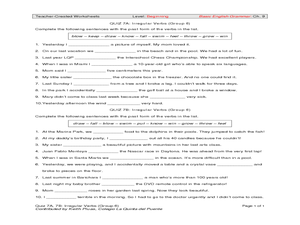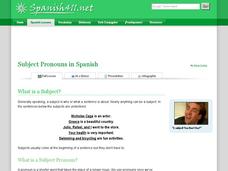Curated OER
Comma Exercise: Exercise 1
In an exercise from the Purdue Online Writing Lab, learners can review 11 rules for comma usage. They then either label 21 sample sentences C for correct as is, or they identify which rule of comma usage is being broken. Though the...
Curated OER
Irregular Verbs
Divided into two 10-question exercises, this worksheet provides practice with irregular verbs in the simple past tense. Ten present-tense, monosyllabic verbs are given in a word bank; learners write the past tense form in a blank in each...
Collaborative Learning Project
Simple to Complex Sentences
Such a creative game idea, this activity might actually make grammar fun! Learners play a modified game of connect-four by identifying the grammatical name for different words and phrases and then working them into simple sentences to...
Curated OER
Possessive Nouns
As a way to explore possessive nouns in an interesting way, this presentation has a list of rules, examples, and practice questions. This would be a terrific way to review material you have already covered in class. You could also use it...
Curated OER
What Are Pronouns?
Using an interactive approach, learners explore the rules regarding pronouns. This is a great way to review this topic with younger students. It gives them a motivating way to internalize the idea.
Curated OER
Verbs
Review fifth-grade grammar using this resource. Learners identify what a verb is, identify verbs in sentences, and go on a treasure hunt. There are also several suggestions for games they can play to practice using verbs.
Curated OER
Verb Forms
Targeting some commonly misused verbs, this worksheet could help students avoid language-related errors. While just a short review of verbs, it could be a way to introduce the importance of proper word usage.
Curated OER
Capitalization
As an easy way to review capitalization rules, an upper elementary or middle school teacher could use this activity. Learners answer 10 questions by identifying whether or not the nouns in the the sentence should be capitalized.
Curated OER
Verbs
Help your learners make their writing more meaningful and lively. They review the ways verbs are used in a sentence, describe passive and active types, and discuss techniques for improving their writing. This resource could be a...
Curated OER
Adding -ly to Words
Review the use of the -ly ending with this presentation. Learners take a list of words and change them into their adverb form by adding the suffix -ly. The resource also includes an exercise involving words such as usual, angry, and...
Curated OER
Tenses: Verbs in the past, present, and future tenses
Use this presentation with your ELLs, younger learners, or as practice for those finicky 4th graders. Verb tense and usage is covered from present, past, to future. There are several examples provided as well as six verbs to be put into...
Curated OER
Birthday Verbs
Use this vocabulary development resource as flash cards or with an iPad. Autistic or special needs pupils can review birthday related vocabulary words. Each word is a verb and each associated image shows that verb as it is occurring at a...
Curated OER
ASL Lesson 18
Have a discussion, review nouns, and practice speaking using ASL. Lesson 18 of 30+ extensive lessons on using American Sign Language covers classifiers, coded English, and asking questions. Each link embedded in the lesson provides a...
Curated OER
Making Your Sentences Work: Subject-Verb Agreement
Review subject-verb agreement with your class. Demonstrate the different verb forms when the subject is singular, plural, compound, and an indefinite pronoun. Not too long, this presentation is nonetheless thorough, especially for...
Curated OER
Los sustantivos
Your beginning Spanish speakers will learn basic classroom vocabulary with this quick PowerPoint. It introduces the key vocabulary terms, their corresponding gender, and the article for each. The last five slides provide a brief...
K12 Reader
Comparative & Superlative Practice
When should you use more and most when writing adverbs? Practice comparative and superlative adverbs with a review worksheet. After reading through the information at the top of the page, kids decide if they should use the comparative or...
Curated OER
Conquering the Comma
Thoroughly review where to put commas: after an introductory clause, before a coordinating conjunction, around nonessential phrases, etc. Furthermore, avoid comma splices by adding a conjunction or semicolon or by starting a new sentence...
Curated OER
The Gender of Nouns
A great handout for middle-schoolers learning nouns and their genders, this resource is comprehensive and easy to read. Consider providing some practice opportunities for your learners while you review the information.
Curated OER
Possessive Adjectives
Reviewing possessive adjectives with your Spanish speakers? Use this well-organized resource to give them extra practice. Consider having learners that finish early translate the sentences in the second section.
Curated OER
Possessive Adjectives
There are 20 fill-in-the-blank questions for your Spanish speakers to complete. Each sentence is missing the correct possessive adjective; can your class use the correct one to complete the sentence? Since this learning exercise doesn't...
Curated OER
Ser Worksheet 1
Now that your Spanish scholars have worked with the verb ser, provide them with this worksheet before reviewing for a unit test. Consider extending the activity by asking learners to translate numbers 4, 7, 13, and 22.
Curated OER
Ser Worksheet 2
Ser and Estar are two of the most important verbs in Spanish. Use this learning exercise to review the present tense conjugations of the word ser.
Curated OER
Subject Pronouns in Spanish
A great tool for beginning Spanish speakers, this sheet provides a subject pronoun chart and provides a brief practice exercise. When reviewing the answers, consider using choral response to engage all learners and give them the...
Curated OER
Reflexive Pronouns
What a great review of reflexive pronouns! Grammarians of all ages will benefit from this packet. The first page gives descriptions and examples of different reflexive pronouns and common mistakes. The second page holds two, short...

























